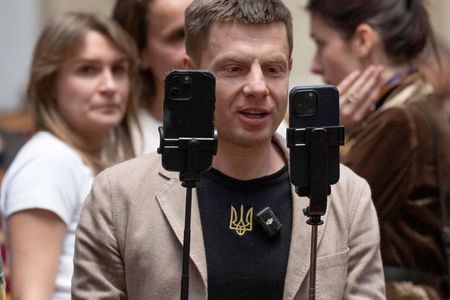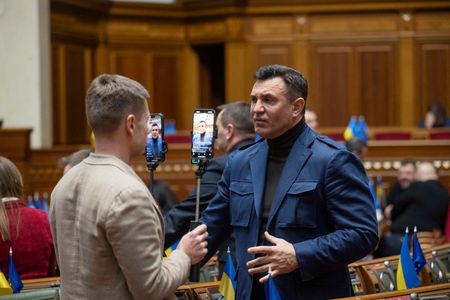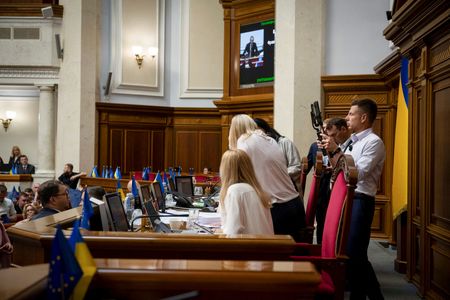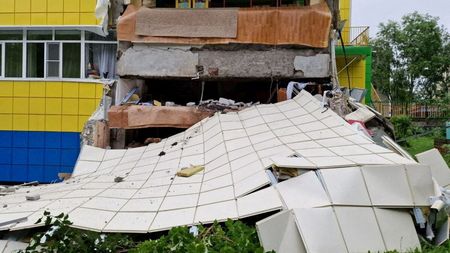By Dan Peleschuk
KYIV (Reuters) -Swivelling his selfie camera around the floor of Ukraine’s parliament, opposition lawmaker Oleksiy Honcharenko beamed out a real-time view of colleagues fast-tracking legislation that would soon spark the biggest political crisis since Russia’s invasion.
“Friends, this is how parliamentarianism is being destroyed in Ukraine,” he said in the July 22 broadcast to his more than 2 million social media subscribers.
Honcharenko is one of a handful of politicians in Ukraine’s parliament, mostly from the opposition, who have filled the gap left by a wartime suspension of an official live broadcast.
They provide followers with play-by-play text and visual updates of Ukraine’s thorny politics, which helped to fuel a popular backlash against a law pushed through last week by the ruling party to defang anti-corruption watchdogs.
The practice of airing parliamentary sessions, once a staple of Ukraine’s vibrant political culture, was scrapped after Russia’s February 2022 invasion because it was considered a security risk.
Honcharenko and several other opposition members stepped in, using their platforms increasingly since 2023 to keep Ukrainians up to speed on the inner workings of Ukraine’s 450-seat legislature.
Events there captured public attention last week after lawmakers led by President Volodymyr Zelenskiy’s Servant of the People party rammed through measures curbing the powers of two prominent anti-corruption agencies.
The vote, which the opposition said had been marred by procedural violations, was documented online by Honcharenko and at least one other opposition lawmaker.
Within minutes of the legislation passing, some of Ukraine’s leading online influencers weighed in, stoking anger that sent thousands of protesters onto the streets of Kyiv and other cities that night in rare wartime unrest.
“Today they simply shat on everyone’s head with this law and set us back 10 years,” wrote blogger Ihor Lachenkov to his 1.5 million Telegram subscribers.
Protesters expressed anger at the speed with which the measures were passed, and some suspected they were designed to protect top officials from investigation. The anti-graft agencies are also crucial to Ukraine’s aim to one day join the European Union.
Zelenskiy reversed course after the outcry and pressure from senior European politicians. Lawmakers will consider restoring the independence of the agencies on Thursday.
Ukraine’s parliament has been in session throughout the war, and until last week’s controversy had largely taken on a rubber-stamp function to pass laws critical to the country’s wartime survival.
NEWSMAKERS OR NEWS PROVIDERS?
On Monday, nearly 70 prominent civic and media organisations called on parliament to restore the broadcast from the chamber, saying transparency was “the foundation of trust in parliament”.
“I think it had a very big significance on people saying ‘No, this isn’t right. This isn’t Europe,'” said Honcharenko, who is the only lawmaker streaming live video, of the impact of his broadcasts on public opinion after last week’s vote.
Broadcasting from parliament is not technically illegal but instead banned by a non-binding resolution respected by most lawmakers. Sessions are posted online later in the day.
A spokesperson for parliament speaker Ruslan Stefanchuk did not immediately respond to questions from Reuters.
Calls to resume broadcasting are part of broader criticism among opposition politicians and the public that Zelenskiy’s administration has attempted to monopolise the wartime narrative, including through centralised state television.
His office denies the charge.
“(Opening up parliament) is not convenient for them – that’s clear,” said lawmaker Yaroslav Zhelezniak, who delivers live text coverage of sessions on Telegram, often with scathing wit that is accented by emojis.
He said some of his colleagues who had voted for the controversial measures would not have done so if they knew voters were watching in real time.
Vita Dumanska, head of the pro-transparency group CHESNO said lawmakers’ feeds were not proper substitutes for an official transmission because they can curate what voters see.
“This is not an objective presentation of facts,” said Dumanska, whose organisation led the call by civic groups. “These are facts with a political stance.”
(Reporting by Dan Peleschuk; Editing by Ros Russell)











